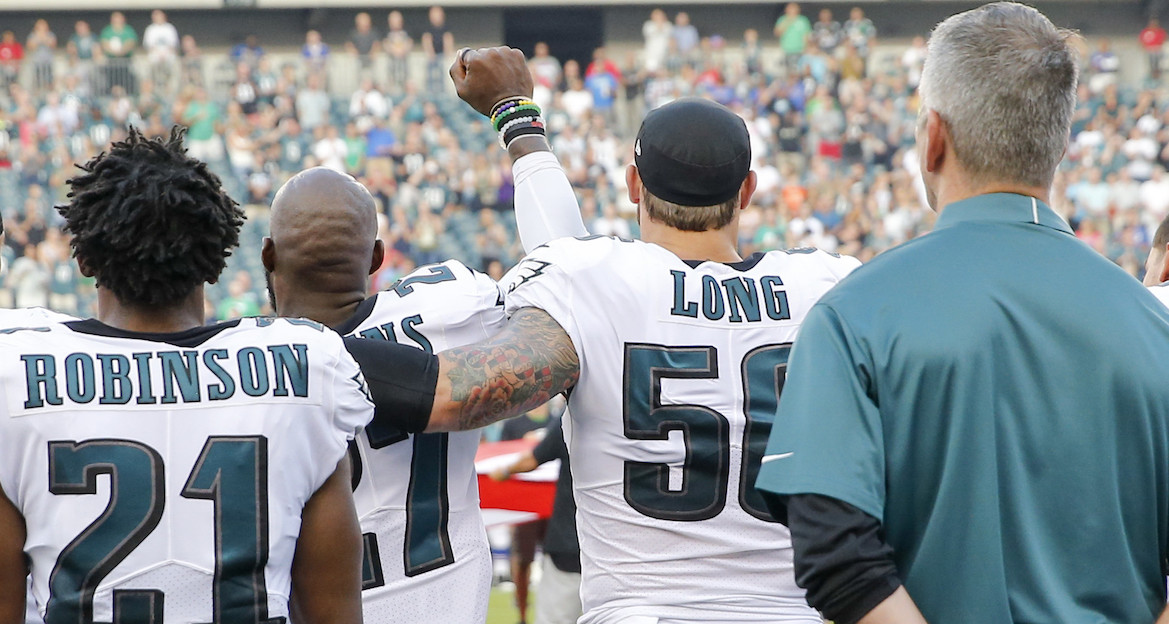
NFL Anthem Protests Gain Momentum as White Players Join In
It was almost a year ago when Seahawks defensive end Michael Bennett first ayeublicly pointed out a key ingredient missing to the slew of athletes protesting during the national anthem.
“The white guy is super important to the fight. For people to really see social injustices, there must be someone from the other side of the race who recognizes the problem, because a lot of times if just one race says there’s a problem, nobody is realistic about it,” Bennett told the Seattle Times last September.
The spotlight was on Colin Kaepernick but, of course, more players, including both Bennett brothers, joined him in utilizing the dramatic stage of the national anthem to protest racial injustice. Yet white players were universally and noticeably silent, leaving last season to feel like a tale of two leagues. One group was determined to showcase the inequalities of its country with a leader bravely risking his career in the process. The other was, well, a group of football players. The optics neatly paralleled this notion.
A year later society has further unraveled. Police brutality remains. Political divides are deeper. Moreover, the leader of the “free” world regularly promotes values and policies that have inspired the dregs of society. White supremacists (Nazi’s and KKK) have been given an infusion of life, which tragically resulted in the death of young girl who was simply protesting their racism in Charlottesville last weekend.
America is on edge. Actually, America is largely scared shitless. In many ways the NFL and all its issues of head trauma and greedy owners and blackballing a quarterback for protesting his first amendment rights seem minute compared to the outside world where it’s 2017 and people like me don’t know if I’m going to come home to a swastika on my front door.
But as this last weekend (literally) illustrated, the NFL’s canvas can sometimes be powerful and inspiring in ways beyond one-handed catches and hail mary’s.
Bennett’s call for white players to join the fight always seemed important but until it finally happened it was hard to envision just how affecting the imagery would be. As the anthem played Friday night, Seahawks guard Justin Britt draped his arm on Bennett’s shoulder in solidarity. Britt, a Missourian whose dad was in the Navy, quoted Ben Franklin after the game, making clear why he embraced his teammate.
“Justice will not be served until those who are unaffected are as outraged as those who are”
-Ben Franklin pic.twitter.com/MSRtHDVRBe— Justin Britt (@JustinBritt68) August 19, 2017
The day before Britt’s show of solidarity, Eagles defensive end Chris Long, an outspoken, intellectual stalwart who happens to consider Charlottesville his home, put his arm on activist teammate Malcolm Jenkins during Thursday’s anthem.
“I think it’s a good time for people that look like me to be here for people that are fighting for equality,” Long told reporters after the game.
Raiders quarterback Derek Carr followed suit Saturday night as he stayed connected to linebacker Khalil Mack (who was not protesting) during the anthem.
“We wanted to show them that it’s OK for a white kid and a black kid that come from two different neighborhoods [can] grow up and love one another and be best friends,” Carr said.
Carr was not the only Caucasian member of the Raiders providing a public show of unity. Less publicized but equally powerful, Raiders offensive coordinator Todd Downing put his hand on fullback Jamize Olawale. (Pointed out by Twitter friend, Dave Zirin of The Nation.)
NFL coaches are bred to be politicians, often tiptoeing so as not to offend their owners and fan bases. They usually talk in cliches as rarely push the envelope when talking about anything outside of a film room. Almost every one of them aside from Chip Kelly has stumbled over themselves when attempting to discuss Kaepernick.
Downing did not take a knee nor raise a fist. Neither did any of the white players who reached out to teammates. But it was still crystal clear that they joined the protests simply by not uniformly standing motionless during a 3-minute national anthem that the NFL would rename “God Bless the Military” if it had its druthers. Instead they used the forum to connect to their black teammates who continue to have their psyches shattered by a country that empowers white supremacists. By publicly connecting to their black teammates, they beautifully showcased how they too were affected by the racial injustices in our country.
Downing actually retweeted Britt’s Franklin quote about getting outraged, a signal that he has no plans to shrivel up and head back into a coaches’ chamber devoid of politicization.
If league owners thought that effectively banning Kaepernick from the league would quell player protests, they were clearly mistaken. They underestimated the cloud of toxicity that exists in our nation and the brave players – black and white – who are more than a jersey and a stat sheet. Just like that the national anthem playing at a non-World Cup or Olympic sporting event seems relevant.



